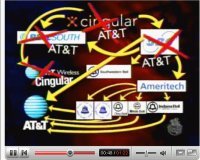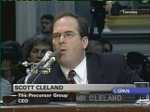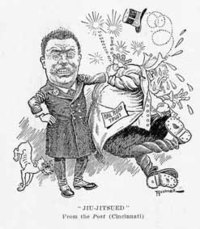Think of this as Volume 11, Number 2 of A-Clue.com, the online newsletter I’ve written since 1997. Enjoy.
The difference among Democrats is subtle — perhaps too subtle for TV to catch.
But it’s there.
I’ve compared Hillary Clinton to Richard Nixon before, the key to that comparison being her role in the AntiThesis to Nixon’s Thesis, which still governs America in 2008, and the ruthlessness which many Democrats, as a result, see as her strength. I’ve also talked about Barack Obama’s comparison to Reagan and my love for John Edwards.
Edwards’ star is fading fast, unfortunately. His populism is drawing people like me, those accused of wealth and guilty of education, but failing among its target audience, those with lower-middle incomes. Democrats in that group are going to Clinton, while Huckabee does well if they’re Republican. Edwards is left with the "limousine liberals," those who know history. I have compared him here to FDR and to those of lower income that’s all FDR is — history.
What the media does — and it wants to do this at an accelerating pace regardless of who it hurts — is winnow down the field quickly. It does this with the early primaries. Single digits in Iowa and you’re out. And after New Hampshire they want a two-man game in each party. Thus Fred Thompson and Giuliani have been dismissed, with Romney given the task of "Michigan-or-bust." And on the Democratic side, Edwards is considered gone.
We’re left with Obama and Clinton, and the real issue, which is similar to what Republicans faced early in the last generation when the battle was between Reagan and Gerald Ford.
That is a choice between the new values and the old interest groups.
Clinton long ago made her bed with the lobbyists. The whole idea of
the Clinton AntiThesis was to bring over enough business support to be
competitive, while feeding liberal interest groups rhetoric and fear of
the other side. That’s their schtick. That’s how they roll. When they
pass things like NAFTA, or roll over on Iraq, that’s the excuse — it
could have been worse, now aren’t you glad I’m around so it isn’t?
But when you go from that defensive crouch to offense, when your
grassroots start embracing new myths, new values, and new media, this
becomes a liability.
We can see it clearly in Clinton’s Internet plans.
They’re nothing more than a sop to the Bell lobby, another set of
subsidies to the people who stole $200 billion from us, and who keep
Moore’s Law hostage.
Why? Because to her (as to her husband) the Internet is the telecomm
business, just another business interest, simple to placate, easy to
excuse. We could be worse, they’ll say.
But in this case, they couldn’t be worse. New fault lines appear when a new
Political Thesis emerges. In the last generation, this was represented
by the social issues, like abortion or gay marriage. In the rising
Thesis of today it’s Internet issues, like net neutrality, and the role
of the Bells.
We want the Bells to die. We need a competitive Internet, an open
Internet, a network-of-networks controlled at the edge rather than A
Network controlled at the center. This is very important, not just to
online activists like me but to educated young people as well.
Look at the history of the last decade. Moore’s Law has marched
forward in computing, it has marched forward in storage, it has marched
forward in mobility, and it has marched forward in core services,
because costs are declining and those markets are highly competitive.
It has not moved one inch in basic connectivity, not one. All the gains
of VOIP, of DWDM, of WiFi and of DSL have instead been swallowed by the
Bells, which today give us no more bits, at no lower price, than they
did a decade ago.
Think of what’s coming as the Battle of the Scotts.
On the one side you have Astroturf salesmen like Scott Cleland (right). Cleland claims to be an analyst, as many Bell shills claim to be things they’re not, but look where his checks come from. Follow the money, and you know all you need to know about him.
Anyone who cashes checks from Bell companies, from Bell fronts, from Bell lobbyists or from Bell friends has a pointy-headed boss view of the future.
In contrast we have people like Scott Adams (left). Adams writes Dilbert. Adams once worked at PacBell, now part of AT&T. Adams has made a very lucrative career making fun of the ignorance and foolishness of the Bells, but most of us haven’t connected the dots.
Those in the Internet revolution have connected the dots. Maybe not explicitly, but implicitly. And it’s time we did so explicitly.
The current situation is intolerable. It is making the U.S. uncompetitive. It’s not
that we’re investing too little in our Internet infrastructure. We
tried throwing money at it for a decade — we threw it at the Bells —
and we got nowhere.
What the Internet demands is competition. We should all have many
choices of ISPs, using every possible modality — cable, phone
networks, wireless, power line. We need constantly rising bandwidth,
and constantly falling prices. We need for the Internet to be the basic
infrastructure of our society, and for the "phone" and "cable" networks
to go away.
Competition will do that. Monopoly has resisted that, prevented that. And left America falling further-and-further behind.
When I look at the past crises of American history, the crisis we’re
most like here is that of 1896. The world is changing fast, the
powerful are seizing all the benefits, and we need reform in order to
prevent that, to maintain competition, and to spread the benefits of
our new growth widely, so our kids will be able to demand more than we
did, and the market will continue to grow.
In this fight, what’s happening in telecommunications looks
more-and-more like the fight we had to have with the railroads, the
trusts, and ultimately with Standard Oil over a century ago. Someone
has to break up the Bells so they can’t get back together again, both
for their good and for that of the market.
Hillary Clinton won’t do that. John Edwards would have. Barack Obama might.
If Edwards is out, then I’m with the New Thesis. It’s a pretty audacious hope, but that’s where we are.














